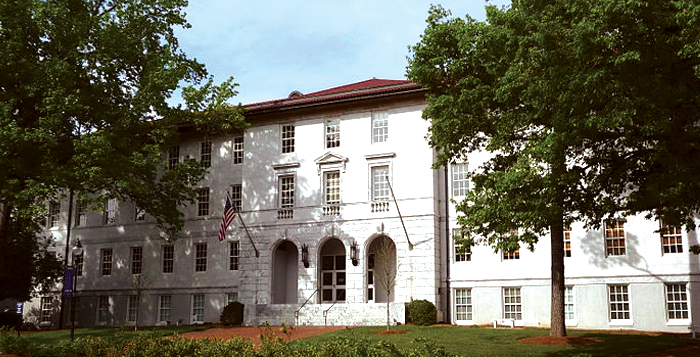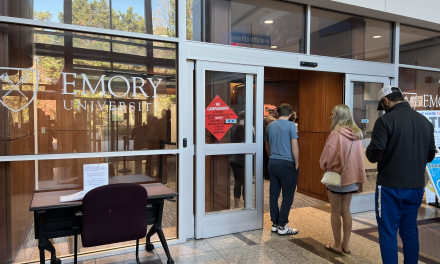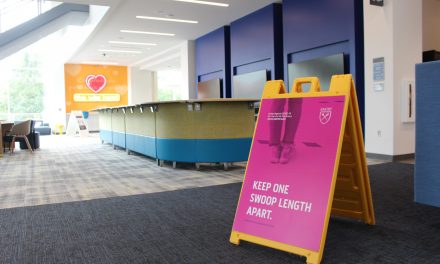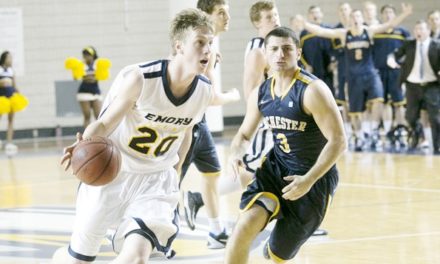The Commission on the Liberal Arts (CoLA) has submitted its final report on developing a vision for Emory University as a residential liberal arts research university, signifying the end of a yearlong process that engaged hundreds of faculty, students and staff.
The report recommends building intellectual engagement through conversation, such as creating discussions around University-wide events; the creation of a new cross-unit course called a synthesis seminar that would focus on different, specific academic topics; and the expansion of mentoring programs, progressively structured in a “Karate belt” system. In the long term, CoLA recommends closer examination of five interrelated strategies ranging from re-evaluation of faculty course load to better telling Emory’s story. These recommendations stemmed from four themes identified in the yearlong investigation and subcommittee reports, which were: ongoing and open communication, creating synergies and leveraging existing programs, evaluation and assessment and changing the infrastructure.
CoLA submitted its report, dated Aug. 29, 2014, to Provost and Executive Vice President for Academic Affairs Claire Sterk, according to an all-Emory email sent Sept. 29. Sterk wrote the delay in the announcement was to ensure she had time to meet with the leaders of CoLA to discuss the report and next steps – a “very important step prior to an announcement that not only acknowledges receipt but also next steps.”
CoLA was established in 2012 in order to reexamine Emory’s definition of a liberal arts education and potential changes to enhance the University’s academic future over the next 25 years, according to a March 2012 Wheel article.
The vision of CoLA, according to the commission’s website, was to “engage in dynamic, transformative conversations with faculty, students, staff and administrators to … define and sharpen our goals and provide guidelines that will invigorate our teaching and our research, positioning Emory structurally and intellectually among the best residential liberal arts research universities.”
CoLA was chaired by Samuel Candler Dobbs Professor of Psychology Robyn Fivush with help from Vice-Chairs Karen Stolley, chair of the Department of Spanish and Portuguese; and Deborah Bruner, associate director of Outcomes Research at the Winship Cancer Institute.
According to Sterk’s email, Fivush will continue to serve and work with partners from across the University to prioritize the recommendations and begin their implementation as the new associate vice provost of academic innovation.
The 29-page document outlines both the process and the recommendations from the commission, including panel discussions, stakeholder consultation and the results of a campus-wide survey answered by 1,063 respondents across students, faculty, alumni and administration.
CoLA was organized into three subcommittees: Learning through Instruction, Learning through Innovation and Learning through Integration, each comprised of two co-chairs and encompassed all academic units, undergraduate students, graduate students, staff, administration, alumni and the Board of Trustees, according to the executive summary of the report.
Fivush said that the most important thing to take away from the CoLA report is that “Emory is already doing so many fantastic things, in and out of the classroom … implementing some of CoLA’s recommendations will build on already existing programs and opportunities in ways that will enhance our community.”
GENERAL THEMES
Four key themes emerged from the yearlong CoLA investigation: ongoing and open communication, creating synergies and leveraging existing programs, evaluation and assessment and changing the infrastructure.
In the report’s recommendations, CoLA begins by clarifying its purpose and context surrounding its recommendations.
“We emphasize that a recurring theme throughout our work has been that to create energy, enthusiasm and excitement, we do not need to do more of the same, we need to do something different,” the report states.
Discussion of the theme of ongoing and open communication centered on “better and more integrated web-based communication” to aid in finding concise, relevant information. The report cites an unclear definition of what a “liberal arts education” entails and also a need to create a “more coherent narrative about its values and mission.”
The report also lists a number of existing structures as examples of desired student-faculty experiential learning, including the Center for Faculty Development and Excellence, the Global Health Institute and the Center for Community Partnerships.
“Many students report that the opportunity for sustained intellectual discussion with such a wide range of faculty and student interlocutors results in one of the most significant experiences of their time at Emory,” the report states .
In regards to creating synergies,” CoLA remarks that Emory offers a “dizzying array of programs, speakers and seminars,” but adding more is not the answer. Instead, the University needs to find better ways of communicating events, utilizing technology and facilitating a coordinated academic calendar.
Finally, the theme of infrastructure states “the successful realization of curricular innovations will depend on the implementation of the infrastructure recommendations enumerated earlier in this report, including coordinated flow of tuition revenue, credit for student matriculation and credit for faculty involvement.”
RECOMMENDATIONS
There are three immediate recommendations and five longer-term initiatives outlined in the CoLA report.
In order to “facilitate the life of the mind,” CoLA recommends a more cohesive intellectual community on campus with events that Emory as a whole is both aware of and feels a sense of cohesion surrounding the resonance of the event. CoLA desires an integrated approach to a targeted number of University events that spark a series of “intellectually cohesive happenings” to spur extended discussion.
Fivush wrote in an email to the Wheel that the “life of mind” is “all aspects of intellectual community, including classroom experiences, extracurricular experiences and community experiences in ways that facilitate critical thinking and problem solving.”
CoLA also suggests an increase in building communities across campus, including an expansion of the Fox Center for Humanistic Inquiry dinners, an interactive network of faculty interests and a series of “continue the conversation” coffee hours, a “relatively simple idea” to facilitate ongoing discussion.
The report points to a lack of University-wide acknowledgment for the many accomplishments and successes of Emory students and faculty, and like other recommendations, a solution centers around creating better channels of communications of both internal and external constituencies.
Immediate action steps proposed are a “Life of Mind” steering committee aimed to identify major “orbit events,” network maps of Emory web pages and the appointment of an “intellectual coordinator” that plans connections between the University’s wide array of events and a timeline of proposed changes.
The second recommendation calls for the creation of cross-unit courses that provides multiple opportunities to fit different faculty and student needs to create “the best possible liberal arts experience.”
This manifests itself in the idea of a “synthesis seminar” that cuts across units, student populations, scholarly inquiry and experiential learning, according to the report.
These communal learning courses would be centered on a specific scholarly issue and would be built with creativity and flexibility to allow for an academic learning community that explores both inside and outside the classroom.
CoLA notes the existing University Courses program as a successful framework to expand the seminar idea.
Third, CoLA calls for an emphasis in faculty-student mentorship as an important aspect of University life.
The report recommends a coordination and centralization of mentoring programs at Emory and a progression based on the Karate belt achievement system. Students begin as a “white belt” mentee and progress all the way to senior and emeriti faculty, represented by the “black belt” of mentorship that not only recognizes the pinnacle of achievement but also “[is rewarding because of] the new self-awareness this belt represents,” according to the report.
Action steps for this recommendation include developing a program for first-year students, creating a system to match mentors with mentees and developing a centralized set of best practices.
LONG-TERM STRATEGY
According to the report, conversations through the year were “exciting, chaotic and energetic” regarding longer-term initiatives. Many of the five recommendations are interrelated, the report states, and all require “a great deal more thought and precision.”
First, faculty evaluation needs to be in line with University priorities, with an emphasis placed on innovation and faculty activities critical to building the intellectual community. According to the survey, faculty across the University feel overwhelmed trying to “do it all” with innovation in the classroom underappreciated. Another suggestion focuses on the consideration of teaching load, with issues including contact hours, number of students, intensive grading hours and more.
CoLA also states a desire to rethink the academic calendar, with the possibility of creating intensive weekend workshops, half semester courses or yearlong courses to open up possibilities for faculty flexibility.
In the long-term view, CoLA also recommends individual faculty be allowed to create multi-year plans to examine trajectories across a career with different emphases on parts of the University’s mission.
The final long-term recommendation is that Emory needs to “tell our story.” CoLA makes the recommendation for an Emory “Story Corps” in which “students and faculty would engage in story-telling focused on their experiences at Emory and/or their professional lives.”
Such a project would create a shared personal and intellectual experience for the University, through “a year of ‘telling our stories’ in order to better ‘tell our story,’ followed by the creation of an ongoing archive,” the report states.
According to the report, Emory needs to develop a clear identity and set strategic priorities to better align its mission with resource allocation and evaluation.
To build the intellectual community, Emory must “prioritize and value those activities that create spaces for intellectual engagement” and “work to create more dynamic and flexible structures that unleash the creative potential of our faculty and students” to allow permeability across the University.
Sterk wrote that CoLA’s work sets the stage for future growth within Emory’s academic community.
“The CoLA participants have brought imagination and innovation to reinvigorate our vision for the liberal arts at Emory,” Sterk wrote. “This process has affirmed that Emory’s people have both a will and a passion to embrace the liberal arts, and I am looking forward to seeing these creative and cutting-edge ideas will enhance our students’ experience and the overall Emory intellectual community.”
– By Stephen Fowler, Assistant News Editor
Stephen Fowler 16C is the political reporter at Georgia Public Broadcasting, the statewide NPR affiliate in Georgia. He graduated from Emory with a degree in Interdisciplinary Studies and covered the central administration and Greek Life for the Wheel before serving as assistant news editor, Emory Life editor and the Executive Digital Editor from 2015-16.






